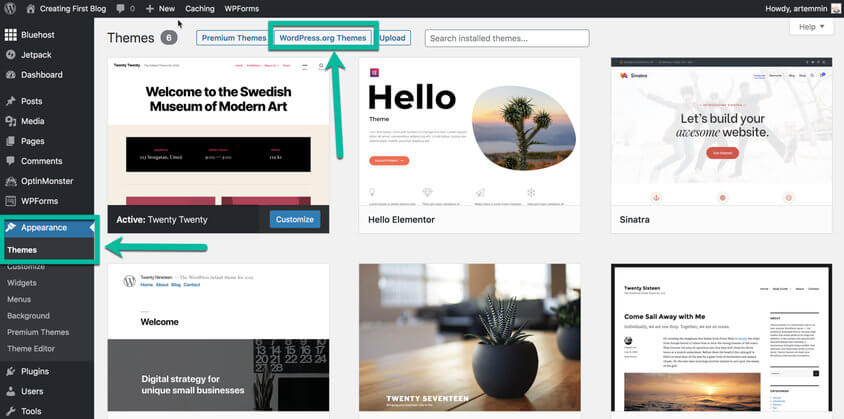Embarking on the Blogging Odyssey: A Comprehensive Guide on How to Start a Blog for Beginners
Emily February 20, 2024
Introduction:
In the vast digital landscape, starting a blog is a journey of self-expression, knowledge sharing, and potentially, a pathway to professional growth. This comprehensive guide serves as a beacon for beginners, illuminating the steps, strategies, and essential considerations to embark on the exciting endeavor of creating and nurturing a blog. From choosing a niche to navigating the technical aspects, this guide aims to be the go-to resource for those taking their first steps into the blogosphere.
Chapter 1: Understanding the Essence of Blogging
1.1 Defining Blogging:
- Explore the fundamental concept of blogging, highlighting its origins, evolution, and the diverse purposes it serves in the digital age. Discuss the potential impact of blogs as platforms for communication, education, and personal or professional development.
1.2 Identifying Your Motivation:
- Guide prospective bloggers in identifying their motivations for starting a blog. Discuss how clarity on personal goals, whether for self-expression, community building, or monetization, will shape the blog’s direction and content.
Chapter 2: Selecting Your Blog Niche
2.1 Exploring Niches:
- Discuss the importance of choosing a niche that aligns with personal interests, expertise, and potential audience demand. Explore different niche options, from lifestyle and travel to finance and technology, helping beginners identify their unique blogging focus.
2.2 Researching Audience and Competition:
- Guide beginners through audience and competition research. Discuss the significance of understanding the target audience and analyzing competitors to refine the chosen niche and develop a unique perspective.
Chapter 3: Planning Your Blog Content
3.1 Content Strategy:
- Explore the fundamentals of developing a content strategy. Discuss the importance of creating a content calendar, outlining topics, and maintaining a consistent posting schedule to engage readers and build momentum.
3.2 Diversifying Content Formats:
- Encourage bloggers to diversify their content formats, including text, images, videos, and infographics. Discuss how a multi-format approach caters to varied audience preferences and enhances the overall reader experience.
Chapter 4: Setting Up Your Blog Platform
4.1 Choosing a Blogging Platform:
- Introduce beginners to popular blogging platforms, such as WordPress, Blogger, and Medium. Discuss the features, ease of use, and customization options of each platform to help individuals make an informed decision based on their needs.
4.2 Registering a Domain Name:
- Guide readers through the process of selecting and registering a domain name for their blog. Discuss best practices, domain extensions, and the significance of a memorable and brand-aligned web address.
Chapter 5: Designing Your Blog
5.1 Selecting a Theme:
- Discuss the importance of choosing an appealing and functional theme for the blog. Explore theme customization options, color schemes, and layouts to create a visually cohesive and user-friendly design.
5.2 Creating a Logo and Branding:
- Guide beginners in crafting a distinctive logo and establishing branding elements for their blog. Discuss the role of branding in creating a memorable and professional online presence.
Chapter 6: Understanding Basic SEO Principles
6.1 Introduction to SEO:
- Introduce beginners to Search Engine Optimization (SEO) principles. Discuss the basics of keyword research, meta tags, and content optimization to enhance the blog’s visibility on search engines.
6.2 Optimizing Images and Multimedia:
- Guide bloggers in optimizing images and multimedia content for SEO. Discuss the importance of file sizes, alt text, and captions to improve search engine rankings and enhance the overall user experience.
Chapter 7: Building Your Blog’s Community
7.1 Engaging with Readers:
- Discuss strategies for building and engaging with a blog’s community. Explore the importance of responding to comments, encouraging discussions, and fostering a sense of belonging among readers.
7.2 Utilizing Social Media:
- Guide beginners in leveraging social media platforms to promote their blog. Discuss the benefits of creating a social media presence, sharing content, and engaging with a wider audience.
Chapter 8: Monetizing Your Blog
8.1 Exploring Monetization Options:
- Introduce various monetization options for bloggers, including advertising, affiliate marketing, sponsored content, and product sales. Discuss the importance of aligning monetization strategies with the blog’s niche and audience.
8.2 Implementing Ads and Affiliates:
- Provide step-by-step guidance on implementing ads and affiliate marketing on the blog. Discuss best practices, ethical considerations, and the potential revenue streams associated with these monetization methods.
Chapter 9: Mastering Blog Analytics
9.1 Introduction to Analytics:
- Explore the significance of analytics in understanding blog performance. Discuss the use of tools like Google Analytics to track website traffic, user behavior, and content effectiveness.
9.2 Interpreting Analytics Data:
- Guide beginners in interpreting analytics data to make informed decisions. Discuss key metrics such as page views, bounce rates, and user demographics, helping bloggers refine their content and marketing strategies.
Chapter 10: Troubleshooting and Optimization
10.1 Common Blogging Challenges: – Address common challenges faced by bloggers, including writer’s block, fluctuating traffic, and technical issues. Provide practical solutions and tips to overcome these challenges and stay motivated.
10.2 Continuous Learning and Optimization: – Emphasize the importance of continuous learning in the ever-evolving landscape of blogging. Discuss resources, courses, and communities where beginners can stay updated on industry trends and refine their skills.
Chapter 11: Scaling Your Blogging Journey
11.1 Expanding Content and Audience: – Discuss strategies for scaling a blog by expanding content categories and reaching a broader audience. Explore collaborations, guest posts, and partnerships to elevate the blog’s reach and influence.
11.2 Exploring Advanced Techniques: – Introduce advanced blogging techniques, such as advanced SEO, email marketing, and podcasting. Discuss how incorporating these techniques can elevate a blog to new heights and open doors to diverse opportunities.
Conclusion: Nurturing Your Blog into a Digital Legacy
In conclusion, the journey of starting a blog for beginners is a rewarding expedition into the realm of self-expression and online influence. This comprehensive guide has provided the essential roadmap to navigate the intricacies of blogging, from conceptualization to monetization. May your blogging odyssey be filled with creativity, growth, and the fulfillment of your digital aspirations. Happy blogging!







